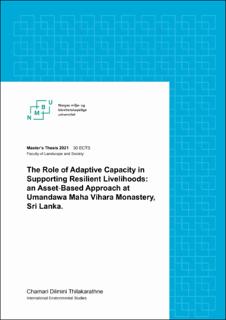| dc.description.abstract | The purpose of this study is to examine and understand the role of adaptive capacity and livelihood resilience as a pathway for building sustainable livelihoods in Sri Lanka. Using the Sustainable Livelihood Framework (SLF) as both conceptual and interpretive lens, this study highlights the importance of access (possession) to the livelihood capitals/resources of a) human, b) social, c) natural, d) physical and e) financial for building livelihood resilience. This study also shows how institutional processes and vulnerability can shape and influence a community if it has adequate access to those livelihood capitals to pursue resilient livelihood strategies, or not.
This is a case study of adaptive capacity and livelihood resilience in a Buddhist community called the Umandawa Maha Vihara Monastery (UMVM) in Sri Lanka. An approach of qualitative and explanatory study has been predominantly conducted in January 2020 by carrying out semi-structured interviews, participatory observations, and focus group interviews.
The findings reveal a highly context-specific example of adaptive capacity that enhances the diversified livelihood strategies in achieving resilient livelihood outcomes at UMVM. By assessing the five capitals of UMVM, the study identifies the importance of strong leadership for fostering greater social capital through their social networks. In addition to these key asset-based aspects, trust within the community is equally important to the adaptive capacity in strengthening their livelihood resilience. As for the evaluation framework (SLF), it provides a useful tool for analysing the resource-base of livelihoods that can be tailored to different contexts.
Keywords: adaptive capacity, resilience, livelihood capitals, sustainable livelihoods, sustainable livelihood framework, leadership, social capital, social networks, trust. | en_US |

